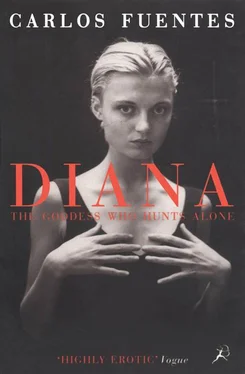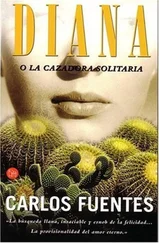Carlos Fuentes - Diana the Goddess Who Hunts Alone
Здесь есть возможность читать онлайн «Carlos Fuentes - Diana the Goddess Who Hunts Alone» весь текст электронной книги совершенно бесплатно (целиком полную версию без сокращений). В некоторых случаях можно слушать аудио, скачать через торрент в формате fb2 и присутствует краткое содержание. Год выпуска: 2012, Издательство: Bloomsbury UK, Жанр: Современная проза, на английском языке. Описание произведения, (предисловие) а так же отзывы посетителей доступны на портале библиотеки ЛибКат.
- Название:Diana the Goddess Who Hunts Alone
- Автор:
- Издательство:Bloomsbury UK
- Жанр:
- Год:2012
- ISBN:нет данных
- Рейтинг книги:3 / 5. Голосов: 1
-
Избранное:Добавить в избранное
- Отзывы:
-
Ваша оценка:
- 60
- 1
- 2
- 3
- 4
- 5
Diana the Goddess Who Hunts Alone: краткое содержание, описание и аннотация
Предлагаем к чтению аннотацию, описание, краткое содержание или предисловие (зависит от того, что написал сам автор книги «Diana the Goddess Who Hunts Alone»). Если вы не нашли необходимую информацию о книге — напишите в комментариях, мы постараемся отыскать её.
Diana the Goddess Who Hunts Alone — читать онлайн бесплатно полную книгу (весь текст) целиком
Ниже представлен текст книги, разбитый по страницам. Система сохранения места последней прочитанной страницы, позволяет с удобством читать онлайн бесплатно книгу «Diana the Goddess Who Hunts Alone», без необходимости каждый раз заново искать на чём Вы остановились. Поставьте закладку, и сможете в любой момент перейти на страницу, на которой закончили чтение.
Интервал:
Закладка:
Diana hung her head. “The director told me, If she’d dealt diplomatically with all of them — the kings, the generals, the bishops, and the feudal lords — she would have lived a long time. She was a woman who couldn’t give an inch. She didn’t know how to compromise. She was a masochist. She wanted to suffer so she could go to heaven.”
She threw her arms around my neck, deeply moved, almost sobbing: What should we do, give in, stand fast, live a long life or die young, burned at the stake, what? Tell me, love.
I tried to be good-humored because my emotions were taking control of me as well. But nothing came out; the Holy Spirit did not visit me that night. I made a sign of discretion with my finger so everyone would understand. They stared at us, shocked. I led her out to the wooden balcony that hung over a ravine. The cold night air of the desert revived us. “If only you’d directed me.” Diana presented me with her dimpled smile.
“Shaw says Joan was like Socrates and Christ. She was killed and no one lifted a finger to defend her.”
“I asked to see Dreyer’s film The Passion of Joan of Arc. They — the studio — didn’t want me to. They thought it would influence me. That the comparison would devastate me. Falconetti was such an infinitely sad Joan, sweetheart — I didn’t have that sadness, there was no place inside from which I could extract it…”
“So you decided to be Saint Joan in life.”
She looked at me inquisitively. “No. I decided Joan was crazy and deserved to die in the flames.”
Surprised, I pressed her to go on.
“Yes. Anyone who fights for justice is crazy. Christianity is madness; freedom, socialism, the end of racism and poverty, they’re all crazy. If you defend all those crazy things, you’re a witch and you’ll end up in the fire …”
Never did she look at me with greater melancholy, as if through her nocturnal eyes, so clear, were passing Dreyer’s chiaroscuro images — Falconetti with her hair shaved off and her eyes bloodshot like grapes, the white walls, the bishops’ black robes, Antonin Artaud’s bloodless lips promising other paradises …
“There’s a very old philosopher from Andalusia, Maria Zambrano, who says the following: Revolution is an annunciation. And the vigor of the revolution may be measured by the eclipses and falls that it survives. Joan was a revolutionary. She was a Christian.”
“The bad thing”—she spoke with sudden bitterness—“is that the director didn’t understand that… The idiot thought Joan was a saint because she suffered, not because she enjoyed being intolerable for everyone.”
“She had to be burned,” I said in conclusion, rather thoughtlessly.
“Literally, literally. The director tied me to the stake, he ordered the fire lit, and he didn’t even film the scene. He watched how the flames came closer and closer to me. He wanted to see me terrified so he could make me into his Saint Joan. He should have let me be burned up then and there, the son of a bitch. The crew saved me when the flames were touching my robe. The director was happy. I had suffered: I was a saint. He didn’t let me be a rebel. We both failed.”
This statement restored Diana’s serenity.
“To escape the director’s tyranny, I married a famous writer who could dominate the director and every studio in Hollywood.”
“Did he also satisfy you?”
“Never say anything bad about Ivan.”
She glared at me as if I were someone else, a man made of glass, another glass graduate.
“I admire him greatly,” I said with a cordial smile.
“Never laugh when you talk about him, either.”
She turned on her heel and walked back into the living room. I followed her. The actor, by now very drunk, hopelessly lost in the geography of Mexico, repeated incessantly, “I’m very cross in Vera Cruz, I’m very cross in Vera Cruz”; his girlfriend wondered if Lilly, the rising star, would last or not; and the cinematographer said he had a portable solution to all problems of sexual solitude while on distant locations: he pulled down his zipper and showed us his sex (which looked like a huge bruised pear), shouting: Long live self-love! And the actor declaimed, Very cross in Veracruz, and his girlfriend begged him, Don’t be a has-been. I’d leave you. I swear I’d leave you for another man. Success is my aphrodisiac …
“See?” whispered Diana, as the station wagon brought us to the center of Santiago. “Hollywood is a series of capsule biographies, vitamins or poison you can buy in the drugstore.”
XII
Azucena needed no capsule biography. Everything about her seemed uncertain to me at first. Her age, of course. She was short, very thin, with almost masculine sinews, which no doubt derived from a life (maybe more than one) of hard work. The nature of this job with Diana Soren was not uncertain. Azucena was invisibly involved in everything. She packed the bags for trips, unpacked them on arrival, put everything in its proper place. She made sure the clothes were always clean and pressed. She was the one who woke Diana up, brought her breakfast, and organized meals for all of us. She made the indispensable phone calls, got the plane tickets, made hotel reservations, answered telegrams, sent presigned photos of the star (how many requests, on average, came each month?), screened telephone calls, pertinent and impertinent requests. Secretary, lady’s maid, deluxe servant, accomplice, bodyguard? What to call her?
Azucena. She wasn’t pretty. She had one of those Catalan faces that seem hacked out with an ax or born out of a mountain: hard, rocky, angular. Long, thin lips, long nose whose tip trembled, her stare veiled by her eyelids and thick bags, her eyes mere slits that nevertheless revealed an intelligent gleam. Everything depended on the eyebrows and the hairdo. The arc, the thickness of the eyebrow. The form, the color of the hair. Azucena had chosen a neutral hairstyle and a mahogany shade that proclaimed her message: I’ll grow old with this color and this hairdo. I’ll grow old and no one will notice, until everyone thinks I was always the age I was when I died.
I could never forget that on this location, only she and I knew who Quevedo was. “Yesterday’s gone. Tomorrow hasn’t arrived …” But I was curious about the real shape of her eyebrows. The artificial shape was interrogative, not a neutral declaration like her hair but a questioning challenge, arched brows from which surprise was excluded and in which, always, only the question remained.
She was Spanish, so it was easy for us to communicate. Not only because of language but because of a quality I first intuited in her and then verified. Seeing her move — agile and sinewy, always in a skirt, blouse, and cardigan, the professional city uniform of that period, but with two Spanish legs, muscular and strong, with thick ankles — I guessed there were many generations of peasants behind Azucena’s leathery figure. Above all, though, there was a tradition of work, not only honorable work but pride in work. In everything the woman did, the woman took pride. One day, she told me that her grandparents were peasants from the Lower Ebro, that they’d lived in Poblet for centuries. Her parents had gone to Barcelona and set up a small grocery store; they’d sent her to study shorthand, but times in Spain turned bad and young people had to work to support their parents and siblings. She became a waitress, was hired when the Americans began to shoot movies in Spain; she met the mistress’s husband — here she was…
She had, as I say, that dignity in her work which we associate, however much we hate the idea, with the closed European class system. It might also be the result of the ancient medieval dignity ascribed to function, to trades. When we know, centuries before and centuries after, that we were and shall be carters, bricklayers, silversmiths, innkeepers, we lend spontaneous dignity to our place, our work. This certainty — this fatality? this pride? — contrasted with the modern cult of social mobility, the upward mobility that makes us eternally unsatisfied with the place we occupy, eternally envious of those who’ve reached a place superior to our own, who probably did so, of course, by usurping the place that was rightfully ours…
Читать дальшеИнтервал:
Закладка:
Похожие книги на «Diana the Goddess Who Hunts Alone»
Представляем Вашему вниманию похожие книги на «Diana the Goddess Who Hunts Alone» списком для выбора. Мы отобрали схожую по названию и смыслу литературу в надежде предоставить читателям больше вариантов отыскать новые, интересные, ещё непрочитанные произведения.
Обсуждение, отзывы о книге «Diana the Goddess Who Hunts Alone» и просто собственные мнения читателей. Оставьте ваши комментарии, напишите, что Вы думаете о произведении, его смысле или главных героях. Укажите что конкретно понравилось, а что нет, и почему Вы так считаете.












